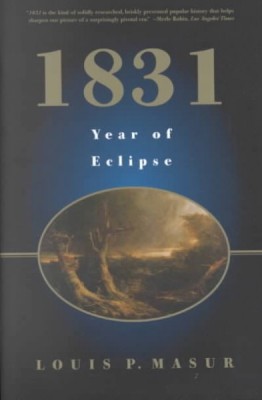| 1831: Year of Eclipse Contributor(s): Masur, Louis P. (Author) |
|
 |
ISBN: 0809041197 ISBN-13: 9780809041190 Publisher: Hill & Wang OUR PRICE: $18.00 Product Type: Paperback - Other Formats Published: February 2002 Annotation: 1776, 1861, 1929. Any high-school student should know what these years meant to American history. But wars and economic disasters are not our only pivotal events, and other years have, in a quieter way, swayed the course of our nation. 1831 was one of them, and in this striking new work, Louis Masur shows us exactly how. The year began with a solar eclipse, for many an omen of mighty changes -- and for once, such predictions held true. Nat Turner's rebellion soon followed, then ever-more violent congressional arguments over slavery and tarrifs. Religious revivalism swept the North, and important observers (including Tocqueville) traveled the land, forming the opinions that would shape the world's view of America for generations to come. New technologies, meanwhile, were dramatically changing Americans' relationship with the land, and Andrew Jackson's harsh policies toward the Cherokee erased most Indians' last hopes of autonomy. As Masur's analysis makes clear, by 1831 it was becoming all too certain that political rancor, the struggle over slavery, the pursuit of individualism, and technological development might eclipse the glorious potential of the early republic--and lead the nation to secession and civil war. This is an innovative and challenging interpretation of a key moment in antibellum America. |
| Additional Information |
| BISAC Categories: - History | United States - 19th Century - History | United States - 20th Century - True Crime | Historical |
| Dewey: 973.5 |
| LCCN: 00031969 |
| Physical Information: 0.8" H x 5.4" W x 8.1" (0.55 lbs) 272 pages |
| Themes: - Chronological Period - 1800-1850 - Chronological Period - 19th Century |
| Descriptions, Reviews, Etc. |
| Publisher Description: 1776, 1861, 1929. Any high-school student should know what these years meant to American history. But wars and economic disasters are not our only pivotal events, and other years have, in a quieter way, swayed the course of our nation. 1831 was one of them, and in this striking new work, Louis Masur shows us exactly how. The year began with a solar eclipse, for many an omen of mighty changes -- and for once, such predictions held true. Nat Turner's rebellion soon followed, then ever-more violent congressional arguments over slavery and tarrifs. Religious revivalism swept the North, and important observers (including Tocqueville) traveled the land, forming the opinions that would shape the world's view of America for generations to come. New technologies, meanwhile, were dramatically changing Americans' relationship with the land, and Andrew Jackson's harsh policies toward the Cherokee erased most Indians' last hopes of autonomy. As Masur's analysis makes clear, by 1831 it was becoming all too certain that political rancor, the struggle over slavery, the pursuit of individualism, and technological development might eclipse the glorious potential of the early republic--and lead the nation to secession and civil war. This is an innovative and challenging interpretation of a key moment in antibellum America. |
Contributor Bio(s): Masur, Louis P.: - Louis P. Masur is the William R. Kenan Jr. Professor in American Institutions and Values at Trinity College in Hartford, CT. He is the author of many books including 1831: Year of Eclipse; Autumn Glory: Baseball's First World Series; The Soiling of Old Glory: The Story of a Photograph that Shocked America; and Runaway Dream: Born to Run and Bruce Springsteen's American Vision. His most recent book, The Civil War: A Concise History, will be published in 2012. |